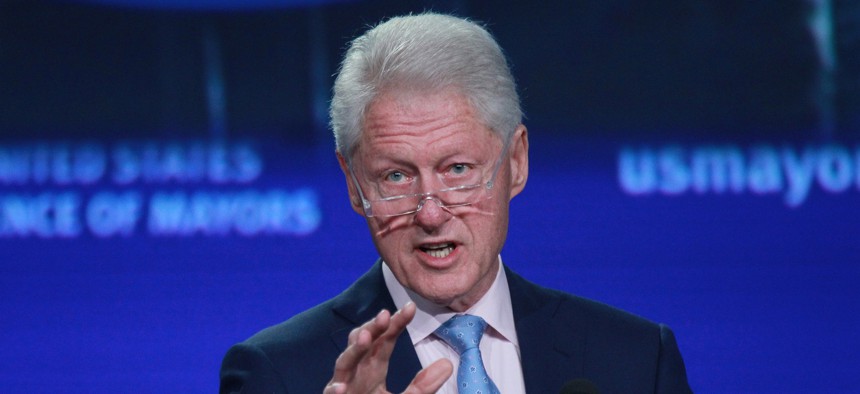Bill Clinton: Mayors Are the Cure to Rising Tribalism in the U.S.

Former President Bill Clinton Courtesy U.S. Conference of Mayors

Connecting state and local government leaders
In a possible subtle jab at Trump, the former president said: “Diverse groups make better decisions than lone geniuses.”
MIAMI BEACH, Fla. — Mayors are uniquely positioned to help the United States rise above divisive tribalism since the last global financial crisis that uprooted social and economic arrangements, former President Bill Clinton told the U.S. Conference of Mayors 85th annual meeting on Saturday.
Being closer to the people they represent means mayors are less likely to engage in political rhetoric, Clinton said, and more likely to understand immigrants are half as likely to commit crimes and Muslim Americans commit murder at one-third the national average.
City officials are also less likely to “stretch the limits of acceptable use of power,” he said.
“Diverse groups make better decisions than lone geniuses,” Clinton said, perhaps a subtle jab at President Trump, who’s called himself “a smart person” and tweeted “my I.Q. is one of the highest.”
Calling cities the “laboratories of democracy,” Clinton outlined several challenges they must face: the opioid epidemic, climate change, aging infrastructure and inequality.
Opioid abuse touches almost everyone, he said, and is unique in that addiction rates are higher in rural America. That it’s hit white Americans harder than African Americans or Latinos has earned the crisis national attention, as has the fact that the crisis has been blamed on doctors, pharmacists and drug manufacturers.
Drug treatment and mental health facilities remain unavailable in rural areas where the epidemic runs rampant.
“We have a chance to deal with this in a comprehensive way,” Clinton told the mayors. “And we’re not close.”
Clinton applauded efforts by many U.S. city halls to embrace the Paris climate agreement as Trump has abandoned it but cautioned words mean little without action because “the water’s going to keep rising."
Pittsburgh has more than 13,000 clean energy jobs, and rooftop gardens are becoming a local industry in New York City—proving the transition to sustainable living is good economics.
“I think this is something mayors can talk about with facts, not rhetoric,” Clinton said.
When it comes to ending educational and economic inequality, “the most important thing we can do as a nation is have a big infrastructure bill,” he said.
An estimated 5 million children lack high-speed internet access due to insufficient broadband infrastructure.
Rural roads and urban water system cleanups will be hard to finance through an infrastructure package, Clinton said.
Turning back to tribalism, Trump praised New Orleans Mayor Mitch Landrieu for removing Confederate monuments from prominent public places throughout the city.
“That’s not us, and slavery was never right,” Clinton said.
Without mentioning Trump, Clinton warned against inclusive economics and inclusive societies in favor of the diversity of cities.
“You are what the framers had in mind,” Clinton told the mayors.
Dave Nyczepir is a News Editor at Government Executive’s Route Fifty and is based in Washington, D.C.

NEXT STORY: President Kennedy’s Important Message to Today’s U.S. Mayors





